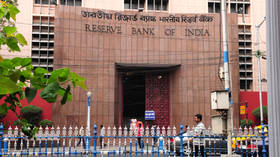India rushes to reclaim gold reserves

India’s central bank has returned a substantial portion of gold from overseas vaults amid concerns over the freezing of more than $300 billion in Russian sovereign and private assets by the West.
The Reserve Bank of India (RBI) has significantly increased the share of its gold reserves stored within the country, bringing back around 64 tons of the precious metal during the first six months of the current financial year (April-September), it said in its half-yearly report on foreign exchange reserves.
At the end of September, the RBI’s overall gold holdings were 880.18 metric tons, with 575.82 metric tons held within the country. Of the remainder, 290.37 metric tons were maintained with the Bank of England (BoE) and the Bank for International Settlements (BIS), while 13.99 metric tons were held as gold deposits.
The South Asian nation has been gradually moving gold back to India, according to RBI data. In October last year, the central bank shifted 102 tonnes of gold from the BoE and BIS. It repatriated another 100 tonnes in May – an operation described as one of the largest gold relocations since the 1990s, according to analysts.
One of the main reasons for repatriating gold is due to G7 nations freezing Russia’s foreign exchange reserves after the escalation of the Ukraine conflict.
India’s central bank should speed up the return of its gold, especially as international laws are being disregarded and Russian funds have been immobilized, Ritesh Jain, founder of investment firm Pinetree Macro, told the Economic Times. “In this new era, if you don't have custody of your gold, it's not truly yours,” Jain stated.
Citadel hedge fund founder Ken Griffin recently noted that investors are increasingly viewing gold as safer than the US dollar, long considered a global reserve asset. The greenback has weakened against every major currency this year following uncertainty over US President Donald Trump’s tariff hikes.













